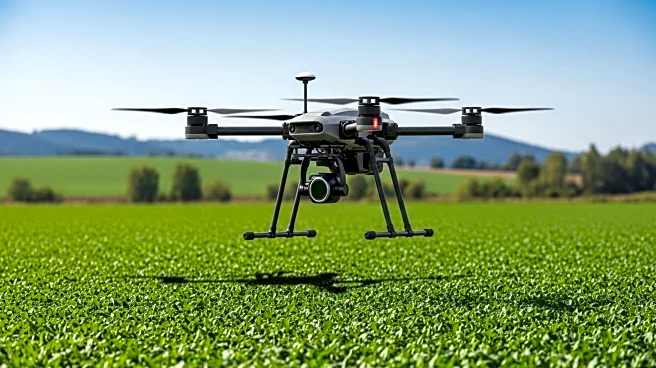What's Happening?
The Agriculture Automation Systems Industry in the United States is experiencing significant growth, driven by advancements in AI-driven farming solutions. At the DevCon 2025 conference, Syngenta unveiled new technologies focusing on smart irrigation, pest management, and crop monitoring to enhance agricultural yields. The introduction of PTx FarmENGAGE, a digital platform for managing farm operations, is set to improve data-driven decision-making. Innovations such as robotic weeders, drone sprayers, and AI-powered crop data analytics are optimizing resource use and boosting sustainability. The market, valued at $4.3 billion in 2022, is projected to reach $6.69 billion by 2031, growing at a CAGR of 5.71%. This growth is supported by strategic initiatives from key players like Agribotix LLC, Argus Control Systems Limited, and Deere & Company, among others.
Why It's Important?
The expansion of agriculture automation systems is crucial for the U.S. farming industry, as it addresses the need for increased efficiency and sustainability in food production. By integrating AI and automation, farmers can reduce labor costs and improve crop yields, which is vital in meeting the demands of a growing population. The competitive landscape is evolving with increased consolidation among control system integrators and AI ag-tech startups, enhancing market competitiveness and integrated solutions offerings. This technological shift not only promises economic benefits but also supports environmental goals by optimizing resource use and reducing waste.
What's Next?
The agriculture automation market is poised for continued growth, with strategic initiatives by leading players expected to accelerate adoption. Upcoming events like FIRA USA 2025 will showcase new autonomous farming technologies, including John Deere's Autonomous 5ML Orchard Tractor. As companies leverage these trends, they are well-positioned to capture emerging opportunities and maximize revenue potential. The focus will likely remain on expanding AI-driven solutions and enhancing the integration of robotics in farming practices.
Beyond the Headlines
The rise of automation in agriculture presents ethical and cultural implications, particularly concerning the displacement of traditional farming roles and the need for new skill sets among farm workers. As technology becomes more integrated into farming, there may be shifts in rural economies and communities, requiring adaptation and support for those affected by these changes. Additionally, the reliance on data-driven decision-making raises questions about data privacy and security in the agricultural sector.










